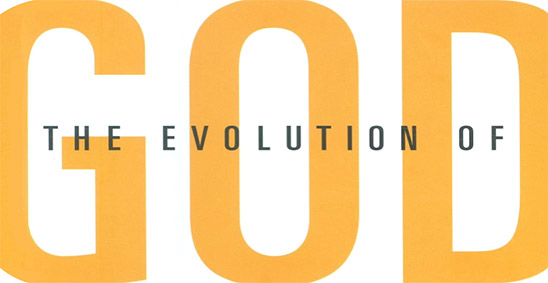Free lecture download
Evolution
How We Know it Happened
& Why it Matters
with Dr. Donald Prothero
The crux of the Intelligent Design argument is that the theory of evolution is in serious trouble, that the evidence for evolution is weak, the gaps in the theory are huge, and that these flaws should be taught to students. In this brilliant synthesis of scientific data and theory, Occidental College geologist, paleontologist, and evolutionary theorist Dr. Donald Prothero will present the best evidence we have that evolution happened, why Darwin’s theory still matters, and what the real controversies are in evolutionary biology.
15% OFF all Lectures at Caltech
From now through December 18, 2009 at 5pm PST, ALL lectures at Caltech are on sale in all formats (DVD, CD, VHS and cassette).
See the ad below in this eSkeptic.
In this week’s eSkeptic, P.J. Rooks reviews Robert Wright’s book The Evolution of God.
P.J. Rooks is a freelance writer and researcher in Overland Park, Kansas. In addition to her regular contributions to Best-Childrens-Books.com, she has also been published in The Kansas City Star and The Best Times.

God is Love
by P.J. Rooks
God is love. The god of the twentieth century, that is. The god of colored Easter eggs and reasons for the season, intercultural naivety, rampant xenophobia and rose-tinted salvation lies, and according to many scientists on the deathbed of his twilight years, a burnt offering on the altar of progress.
Or is God merely evolving? From the days of religion’s infancy when primitive shamans stepped forward to answer questions such as “What is going on when we dream?” or “Why do bad things happen?” right up to the modern era of globalization and the waning idea of a personal savior, Robert Wright asserts in his new book, The Evolution of God, that religion acts as something of a mirror to social Darwinism, reflecting not only our personal bonds with the all-powerful, but also the relationships of our communities to one another through such mediums as trade and conquest. As he did in his previous bestselling book, Nonzero: The Logic of Human Destiny, Wright brings game theory and economic principles to bear on our tattered human history and finds that what unfolds is the childhood of an evolving god taking the next step on the road to maturity.
You Got Your Chocolate in My Peanut Butter…
Back in the day, says Wright, religion wasn’t about the pursuit of a moral good, the establishment of a communal value system, or the hope of personal salvation; religion’s first steps primarily involved explaining the unexplainable, with thunderstorms, natural disasters, and disease ranking high on the list of metaphysical concerns.
The social order grew, however, and the sphere of the divine shrank as skirmishes and syncretism led the way toward a snowballing monotheism. Once-distant tribes and communities faced one another and, with each encounter, they wrangled with the question: friend or foe? The beauty of polytheism was that since there was no One True God, many societies — when it came to celestial figureheads — were happy to mix and match. Sometimes the results were delicious, sometimes not.
Israel’s tragic adoption of a step-god, according to Wright, provides an early example of the political acrobatics that defined the times. In a marriage arranged by their fathers, the union of Jezebel and Ahab mutually benefited both sides through increased Phoenician port access for Israel (Ahab’s side of the equation) and increased trade opportunities for Phoenicia (Jezebel’s side). The trouble was that back then the kingdoms of the wedding party didn’t just lose a royal son or daughter, they gained a whole new menagerie of gods. Wright speculates that while the marriage probably hiked the gross national product of each country, the increased competition was bad news for the Israeli merchants and Jezebel’s Canaanite god-head, Baal, carried the burden of blame. What followed was a bloody showdown in which Baal and some 450 of his followers were summarily (or in Baal’s case, metaphorically) executed.
Sometimes, however, it was better to make nice with the new neighbors. Close encounters among nations might bring business opportunities and those looking to capitalize were quick to erect monuments to the new gods and even to merge the deities. It was a convincing way of saying, “See, we’re not so different, you and I — and hey, while you’re here, wanna buy a widget?” It even worked well for conquering empires who wanted to rapidly bury the hatchet with their conquerees — not to mention that the newly oppressed were less likely to incite rebellion when they were allowed, at least, to keep their own gods.
“People are more likely to be open to foreign gods when they see themselves playing a non-zero-sum game with foreigners — see their fortunes as positively correlated with the foreigners’ fortunes, see themselves and the foreigners as, to some extent, in the same boat,” explains Wright. Shunning the obvious cynicism here, he also points out that it’s pretty standard for most people to be more critical of enemies and more forgiving of friends, so treating new nations similarly is no big leap. “The link between self-interest and tolerance needn’t be a matter of conscious calculation,” Wright continues. “The law of religious tolerance grows organically out of human nature.”
And for Those Who Cannot Rule or Trade, Vengeance
item of interest…
Contrary to conventional wisdom, Robert affirms the validity of the religious quest. Through the prisms of archaeology, theology, and evolutionary psychology, Wright’s findings overturn basic assumptions about the great monotheistic faiths.
ORDER the DVD
Or to put it more simply, “Our god’s on his way and boy, are you gonna get it!” The history of Israel is long on strife, slavery, and submission. Wright quotes Second Isaiah, who savagely drafts the due solace of the nationally humbled with, “I will make your oppressors eat their own flesh, and they shall be drunk with their own blood as with wine. Then all flesh shall know that I am the Lord your Savior, and your Redeemer, the Mighty One of Jacob.” Amusingly, Wright calls this fearsome big brother the “empire-wielding god of reprimand,” and points out the “ironic logic that the more massively your nation is menaced, the more powerful your god must be.”
Then, as now, prophesies of doom and glory served the downtrodden, and Jesus, an apocalyptic Jew and street preacher, picked up the “Our god’s bigger than your god” message where the Old Testament left off. He believed that the end times were nigh and that the kingdom would be arriving on earth any time soon, like next Tuesday. Packing your spiritual bags was a good bit of advice for the faithful and the saved, which, by the way, only included Israelites. Although most of his teaching was based on writings already in place, Wright points out that what Jesus may have done differently was to take a message intended to be applied on the international stage — that Israel will rule while neighboring empires grovel and fall — and spin it toward personal justice. The idea that the last will be first which had, prior to Jesus, always meant “among nations,” now took on the new meaning of “among Israelites,” giving the earliest hints of the personal salvation and brotherly love concepts that Paul would later muscle into a widespread Christian mission.
Any God Will Do
As the years went by, though, and the kingdom of God’s arrival on earth became increasingly tardy, followers began to express concerns. Like, for example, what about those who died before God’s return? How were they to be saved? Explanations emerged in later gospels, particularly Luke, who, according to Wright, may have leaned heavily on the tales of Osiris, the Egyptian god of the underworld, and placed Jesus in a heavenly position of judging the living and the dead. Throw in Paul’s brotherly love, which backhandedly invoked personal morality as a method of social control during a period of massive population influx, and all things came together for a moral code that acted as a one-way ticket to end-times salvation. Sin quickly came to be the word for any activity that detracted from the health and happiness of the group or individual, and in theorizing that Jesus died in forgiveness of sin, Paul tidily explained why any father worth his salt would have allowed his son to be murdered (a loophole which had plagued Christian proselytizers for years) and paved the way for worldwide expansion with a savior who loved his earthbound flock and offered infinite time off for good behavior.
Yet in spite of Paul’s efforts (or perhaps because of them), Christians weren’t terribly popular in the first 300 years or so of the post-Jesus Roman empire. It was not until the polytheistic Constantine carried the cross into battle on a whim and won, that his sympathetic attitude toward Christians became pivotal in the movement away from the pagan gods of the Roman empire and toward what would become the Christianity we know.
According to Wright, however, this probably would have happened anyway because the progress of the world was poised to embrace a new social order and Christianity filled that role. Other versions of the Jesus movement were in place that could just have easily stepped forward if not for Christianity having suddenly found itself with a celebrity spokesperson in Constantine.
As Christianity grew, so too did the advantages of membership. What economists today cool-headedly call positive network advantages, merchants of Roman times called trade organizations. Wright says that in the era of blossoming Christianity, there were still numerous religious cults. It was business as usual for merchants and craftsmen, however, to align their industries with one or two and to tolerate their god as a cost of doing business. Mergers among these groups were a common practice for businesses looking to expand their client base and eventually, as Christianity grew, its sheer size made it the guild of choice for many.
God is Love … Still
Building from his previous work in The Moral Animal, Wright concludes The Evolution of God with an interesting afterword in which he sets out to illustrate how basic empathy — our ability to understand one another as a means of social survival — evolved into a very human sort of love that pings off every far-flung corner of our rapidly globalizing planet. That so many cultures have written upon the pages of Christianity, and that humanity, through the survival of its fittest ideas, grows and improves as it moves forward, is where Wright finds meaning in the mayhem. For him, the evidence of a higher purpose is not so much in the fading image of a personified, Santa-like god, but in the epic coalescence of human struggle and human beauty that may, in its own right, be reason for awe and wonder. Needless to say, Wright’s opinion here is bound to make strange bedfellows of both the believing and the skeptically inclined, uniting the two in mutual offense.
Tracking our immortals from the days of whittling rocks to the days of trading stocks, The Evolution of God rides a razor’s edge between perfectionism and pathology. Wright’s dizzying and sometimes tangled succession of historical abstractions may, at times, feel like an extended mathematical proof. His noble, albeit lengthy, pursuit of complete understanding, however, unveils the historic tale of a beloved spiritual ideal. An ambitious work that eventually nails its target with panache, The Evolution of God is an extraordinary tour of our shared human heritage.

They Came From Outer Space!

Dr. Phil Plait
Are creatures from other planets visiting the earth, trampling our crops to create cryptic messages, violating people in their sleep, and doing terrible things to our livestock? How plausible is it that we are being visited by intelligent beings from beyond Earth, or that we’ve been visited in the distant past?
This week on MonsterTalk, astronomer Dr. Phil Plait, author of Death from the Skies! joins us to talk about monsters — from outer space!

NEW ON SKEPTICBLOG.ORG
Young Earth Creationism = Darwinism?
Young Earth creationists need Darwin to be right — and when you press them on it, they often agree that he was. Doesn’t sound like the creationism you know? It’s not a hacker’s prank, and it’s not a radical re-thinking of creationism. It is, however, a nuance as important as it is surprising…














